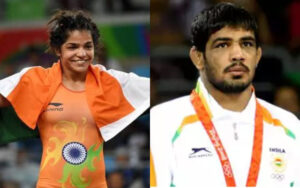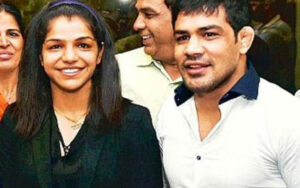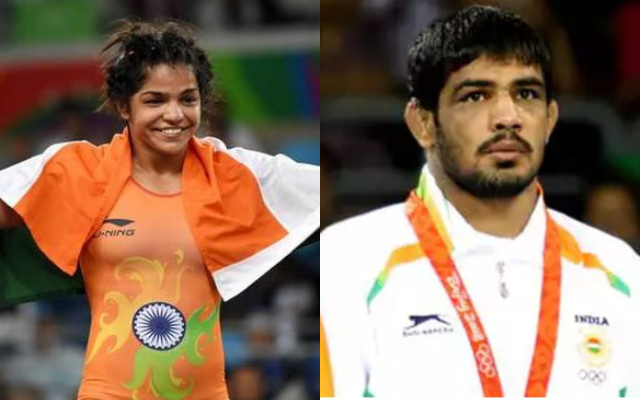
Indian wrestling has undergone a sea change over the decades. From the time a certain KD Jadhav won a historic first medal for India at the Helsinki Olympics in 1952, the wait for another medal was agonising. Come Beijing 2008, when China hosted the Summer Olympics for the first time, the individual who restored pride on the mat was Sushil Kumar. Beijing is always remembered for Abhinav Bindra’s historic gold medal in air rifle and Vijender Singh’s bronze in boxing.
Viewed from a historical perspective, Sushil bouncing back through the repechage system turned out to be path-breaking. Today, everyone who follows Olympic sports knows what the repechage is, but for many present in Beijing, Sushil earning a new lease of life and winning a bronze medal was a pathway to a new world.
Wrestling has always had a mass connect, from the times of pehelwans like Chandgi Ram and Mahabali Satpal, but grappling was more of a mud sport at training level. At the Olympics, which embraced wrestling on the mat in two categories, Freestyle and Greco-Roman, Sushil delivered a long-awaited medal for India.
It is not always possible for an elite athlete to win an Olympic medal at the first attempt. Sushil, too, had competed at Athens 2004, but did nothing of note. When he bounced back through the repechage in Beijing, he became a celebrity almost overnight. He was not suave but a simple soul, whose radiant smile with the medal around his neck featured in multiple interviews over the coming days.
Sushil had become the toast of the nation and though he made it clear that his spoken English was almost zero, even Western media channels wanted his interview. He had to use an interpreter, and no one minded. Sushil smiled through it all, and returned home a hero.
His was the typical rags-to-riches story. Sushil’s father was a van driver for MTNL in New Delhi, a government telecom company. Yet, for his son to get the best diet and train at the Chhatrasal Stadium in New Delhi, as well as the elite Sports Authority of India (SAI) centres, was essential. Sushil changed coaches many times, and because of his Beijing exploits, more than one mentor got a Dronacharya Award.
Between Beijing and the 2012 London Olympics, Sushil changed. He accepted Satpal as his coach and married Savi, his daughter. Satpal had won a medal for India at the Asian Games in New Delhi in 1982. The marriage did not prove a distraction for Sushil. He was focussed and won bouts leading up to the climax, where he clinched silver. The night before the final, Sushil had a bad stomach. Medication was ruled out and he fought very bravely to win silver against Japan’s Tatsuhiro Yonemitsu.
For the Latest Sports News: Click Here

Sushil had not been in the best shape before London. He had battled a shoulder injury and also become overweight. In order to fight at his desired weight, 66kg, he did everything possible before the weigh-in. Wrestlers can go to any extreme to achieve their goals. Sushil stayed hungry to lose the weight.
His initial bouts were tough, but by then, Sushil enjoyed massive respect in Indian wrestling. He needed intense massages, and apart from the physios and trainers, even Yogeshwar Dutt, who won a bronze in London, helped Sushil out.
That was the spirit in Indian wrestling in 2012, with no politics or muck-raking. When Sushil won silver, to make it back-to-back Olympic medals, the initial emotion was disbelief. He thanked coach and father-in-law Satpal, wife Savi and then faced the media. He gave every reporter time to ask questions. Not once did the smile leave his face. “Yeh aap logon kaa aashirwaad aur prem hai [This is your blessing and love],” he would say.
By the time Sushil landed in New Delhi, with drums and conches raising the decibel level to a crescendo, he was a superstar. The garlands around his neck weighed kilos. Sadly for Sushil, dreams of a third medal at the Rio Olympics in 2016 came to naught. The camps and divisions in Indian wrestling had become ugly by then. The selection saga was a mess, and he did not fly out to Rio. Narsingh Yadav, who took his place, was banned for four years on the eve of his first bout, after testing positive for steroid use.
Over the past three years, Sushil has become the bad guy portrayed in movies. How he fell into wrong company is not very clear, but he surrounded himself with stupid people who destroyed his image. To be lodged in Tihar Jail in New Delhi on murder charges is a sad story, though that does not change his champion status on the wrestling mat. For those who watched him in Beijing and London, he will still remain a hero.
If Rio was a disaster for men’s wrestling, Sakshi Malik changed the narrative with her historic efforts. Sakshi was a fierce competitor with enormous hunger and energy. Yet, what was defining was her mindset. When she won that historic bronze in Rio, beating Kyrgyzstan’s Aisuluu Tynybekova 8-5 in the bronze-medal play-off, she was mobbed.
When returning to India from Rio, via Sao Paulo and then Abu Dhabi, Sakshi experienced both joy and grief. Her colleague, Vinesh Phogat, had broken her leg in Rio and it was in a cast. The two were seated together in the front row on a long flight. If Vinesh goes on to win a medal at Paris 2024, she can never forget the shoulder Sakshi lent her. So many tears were buried in the tracksuit jacket Sakshi wore on that flight.
Also Read: Jamie MacLaren Joins Mohun Bagan: A New Chapter Begins





